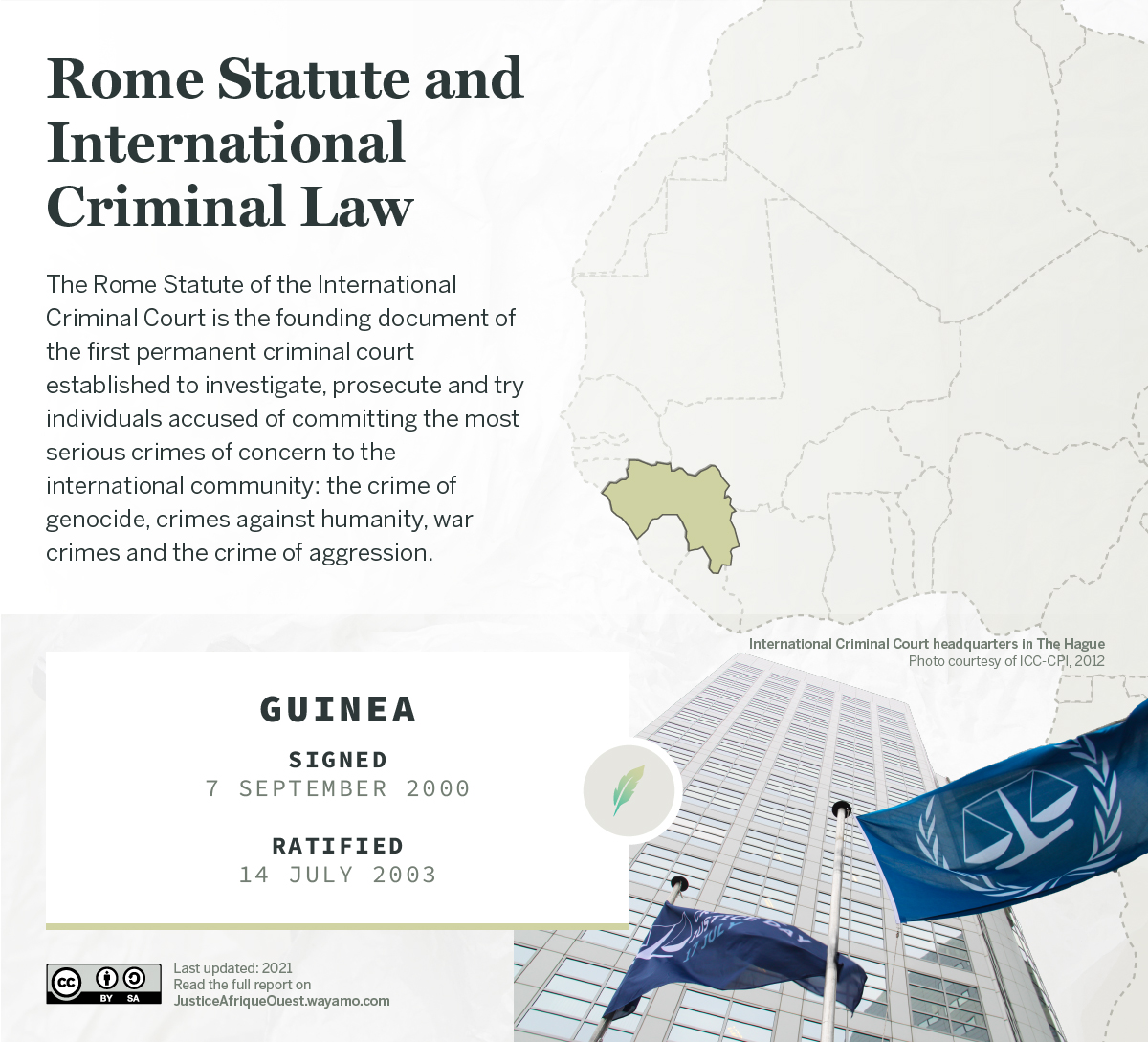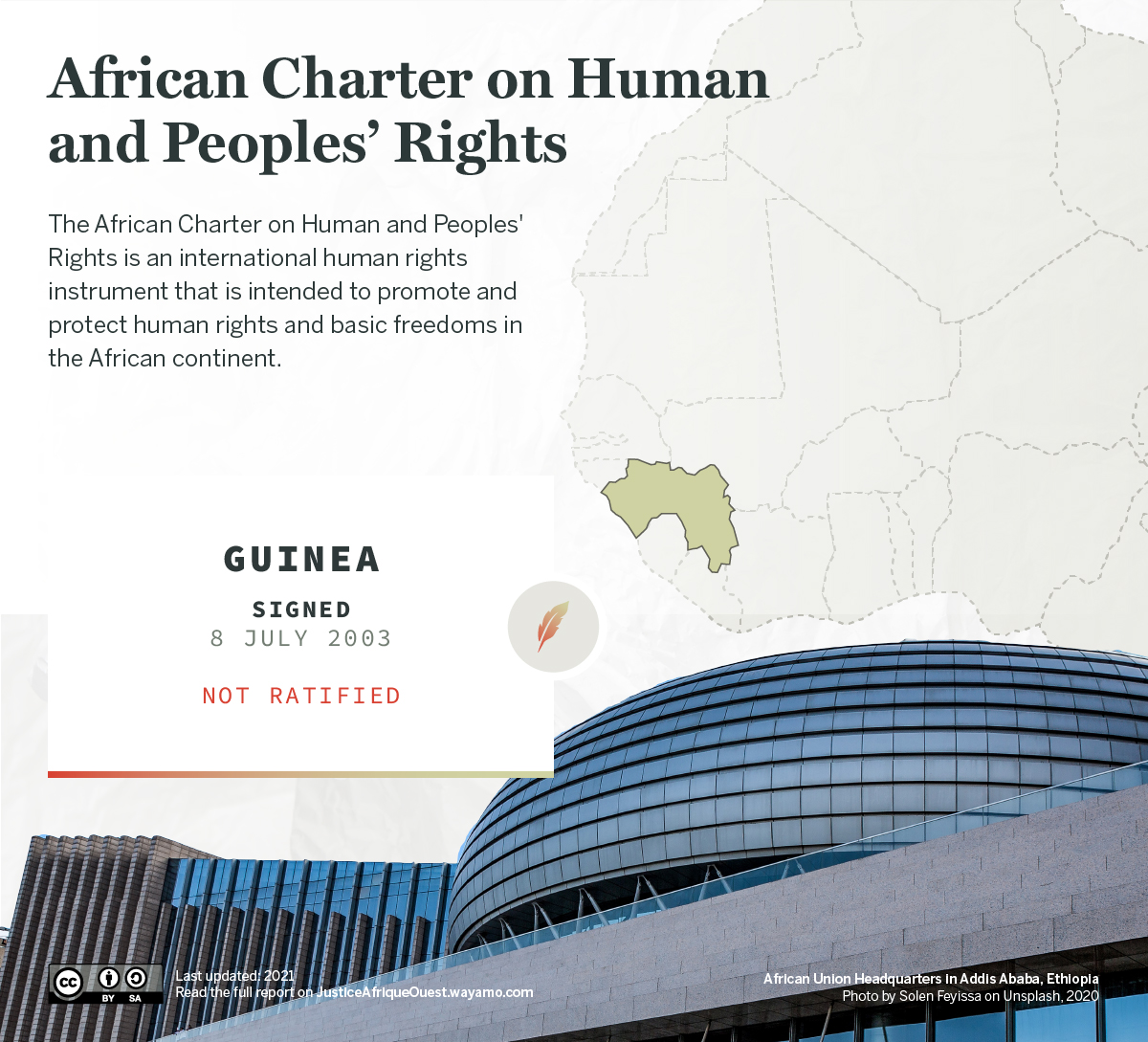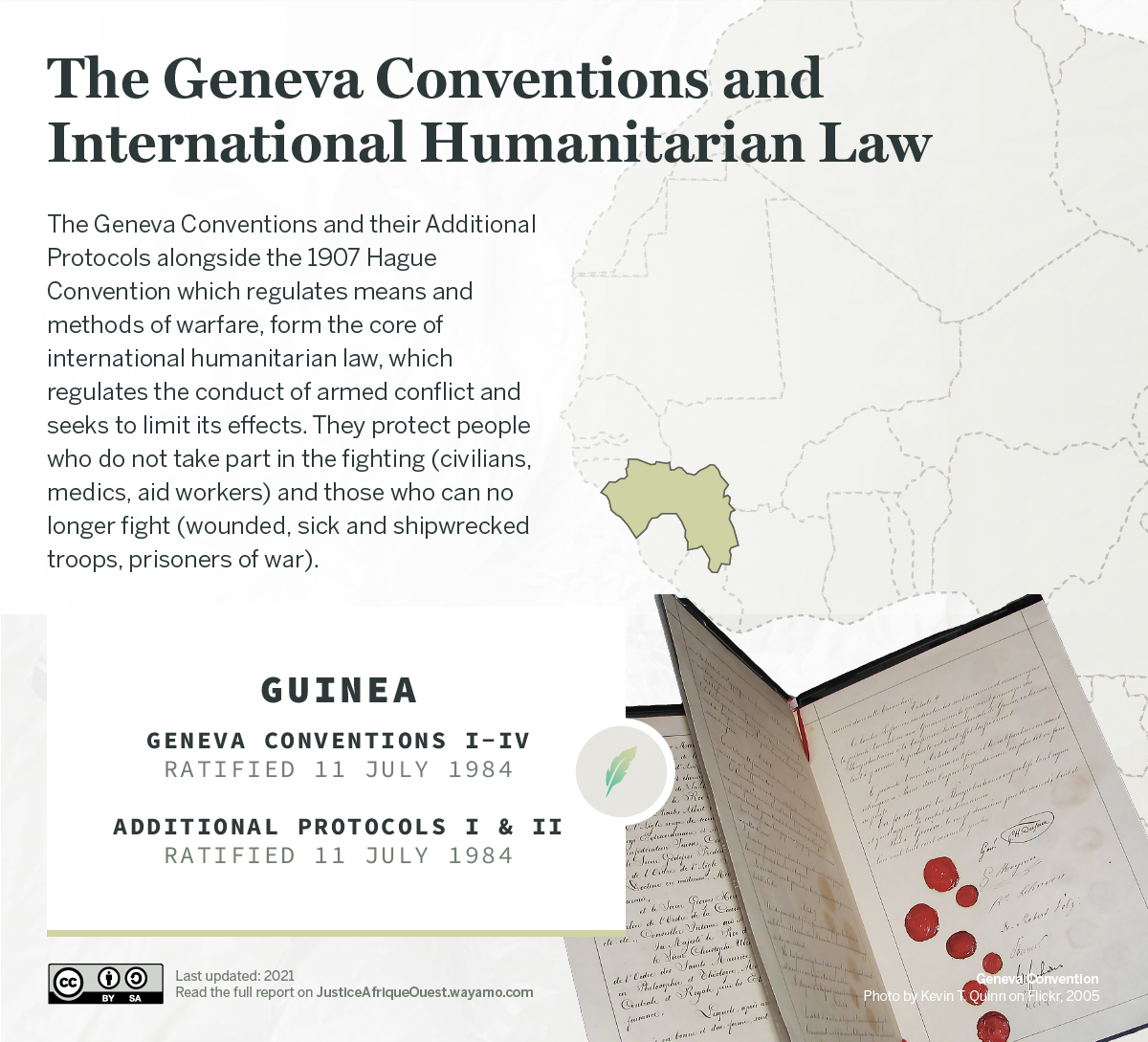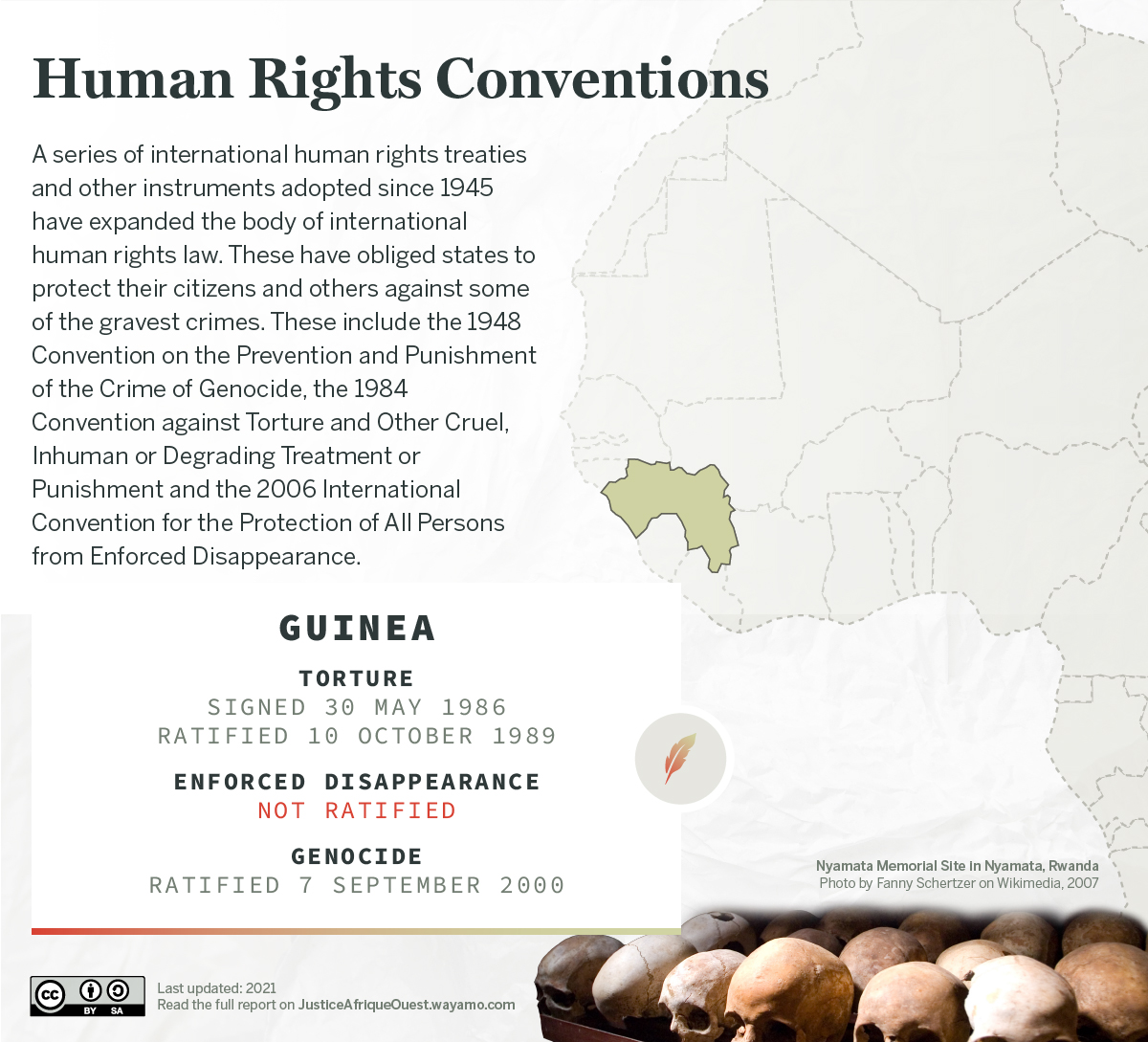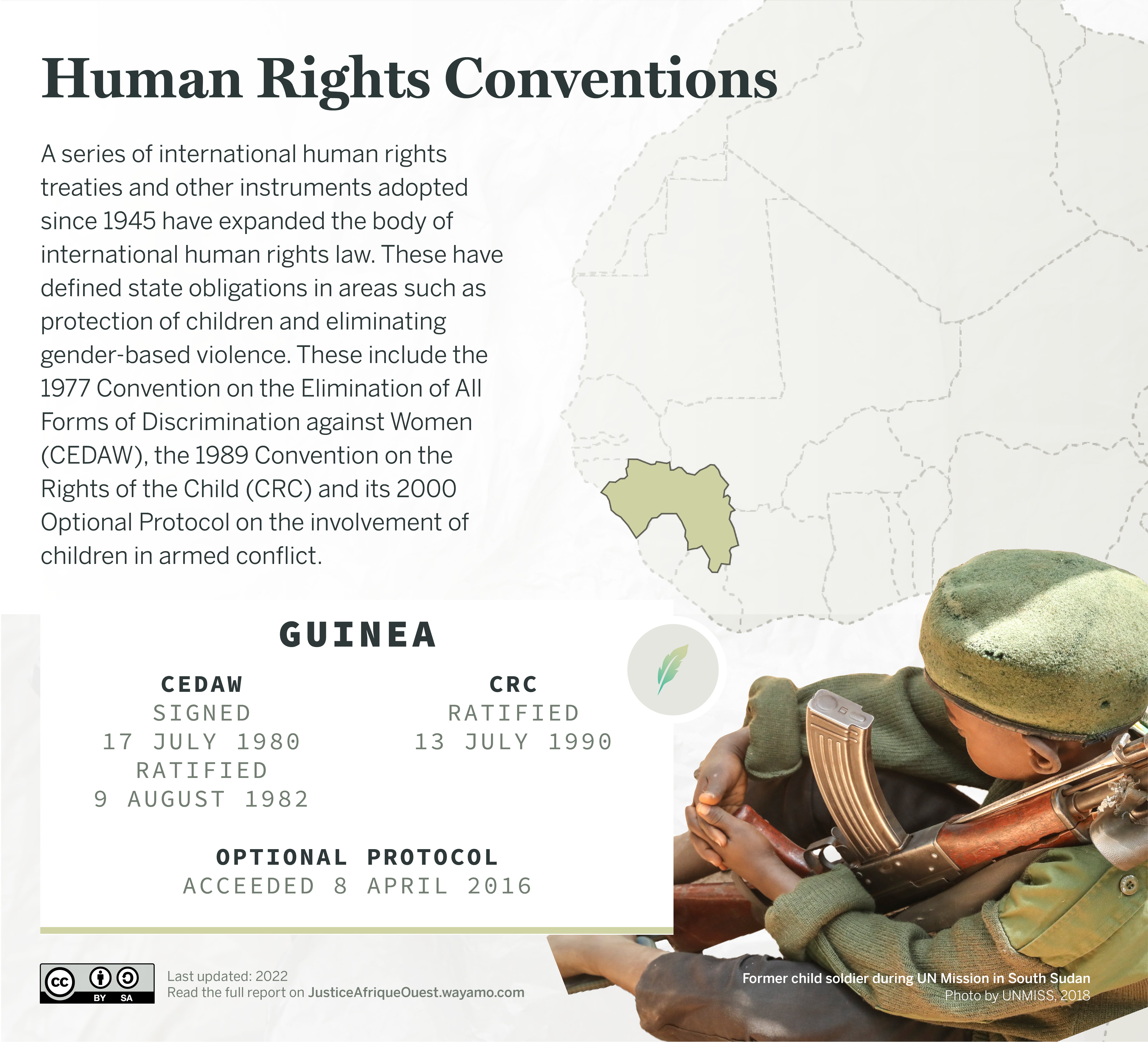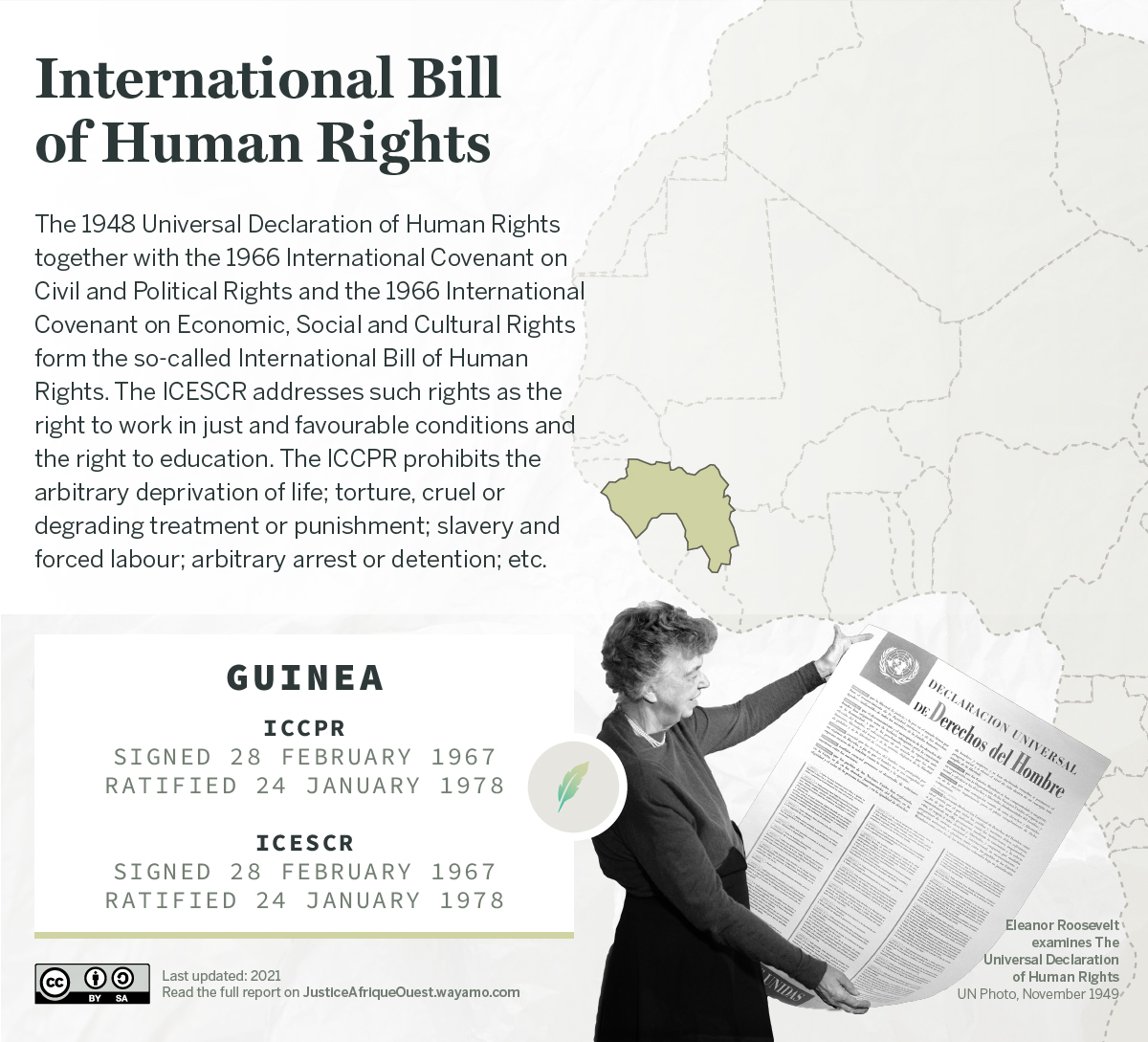Guinea comes under International Criminal Court jurisdiction
Guinea deposits its instrument of ratification to the Rome Statute on 14 July 2003, and giving the ICC has jurisdiction over Rome Statute crimes committed on the territory of Guinea or by Guinean nationals from 1 October 2003 onwards.
Long-time president Lansana Conté dies in office
Conté, a soldier, led Guinea from 1984 after taking over in a coup d'Etat until his death.
International Criminal Court prosecutor indicates that the situation in Guinea is under preliminary examination
Guinea's then-minister of foreign affairs travels one week later to The Hague to meet with the ICC Office of the Prosecutor, where he tells ICC Deputy Prosecutor Fatou Bensouda that Guinea’s justice system is “able and willing” to handle the investigation and prosecution of the stadium crimes domestically
United Nations commission of inquiry established
An international commission of inquiry, proposed by the African Union and the Economic Community of West African States (ECOWAS), is established by UN Secretary-General Ban Ki-moon.
International commission of inquiry issues final report
The commission concludes that at least 156 people were killed or had disappeared, and at least 109 women were victims of rape and other forms of sexual violence.
Sékouba Konaté takes over duties
National commission issues report
The National Independent Commission of Inquiry established by the Guinean authorities concludes that murders, rapes, and forced disappearances have been committed.
International Criminal Court representatives visit Guinea for the first time
Since its first visit in 2010, the ICC has conducted regular visits to Guinea—averaging roughly twice a year—to assess progress in the investigation and press for further advances.
Domestic panel of judges appointed to investigate crimes committed
Panel quickly charge Abubakar “Toumba” Diakité, Guinea’s self-proclaimed president Moussa Dadis Camara's aide-de-camp, for his alleged role in crimes committed in the stadium massacre and rapes.
Civil action from civil society groups
The International Federation for Human Rights and the Guinean Organization for the Defense of Human Rights and the Citizen (OGDH) L'Organisation Guinéenne de Défense des Droits de l'Homme et du Citoyen initiate a partie civile action on behalf of victims’ associations and dozens of individual victims of the 28 September 2009 crimes.
Cellou Dalein Diallo leads after first round of presidential elections
Diallo, who was Prime Minister of Guinea from 2004 to 2006, took the lead after the first round of delayed elections.
Alpha Condé wins 2010 presidential elections in second round
After a delayed run-off vote, long-time opposition leader Alpha Condé wins the election beating Diallo in the second round.
Alpha Condé assumes office as president
Provisional Commission for Reflection on National Reconciliation (CPRN) established by President Condé
Two leading religious figures head the commission, Elhadj Mamadou Saliou Camara, the Grand Imam of Conakry Mosque, and Monseigneur Vincent Coulibaly, Archbishop of Conakry. The commission issues its report in 2016, resulting in amendments to Law on National Reconciliation. Civil society groups express concern that little progress has been made towards implementing the foreseen reconciliation process in the period since.
First indictment for 2009 stadium massacre and its aftermath
A Guinean gendarme was arrested and charged with rape in connection with the September 2009 stadium massacre and its aftermath. As the first indictment of an accused perpetrator of sexual violence during those events, the charging of the unnamed officer was a significant step in the judicial process. However, in a 2019 statement, the Office of the UN Special Representative on Sexual Violence in Conflict emphasised that perpetrators of sexual violence committed during the 2009 attacks still had not faced justice.
Presidential security minister charged
Lt. Col. Claude “Coplan” Pivi, Minister for Presidential Security and leader of the ‘red beret’ presidential guard, was charged for his alleged role in the crimes committed in the stadium in September 2009. Pivi was not put on leave from his government post despite the charges against him.
Cheick Sako appointed justice minister
The appointment of Justice Minister Cheick Sako is widely credited with helping to energise progress in the investigation. Sako’s appointment leads to an increase in the number of security force members questioned.
Moussa Dadis Camara announces candidacy for 2015 elections
The former president announced his candidacy despite being under investigation for crimes against humanity committed during the 2009 stadium massacre. At the time of the announcement, Guinean courts had issued an indictment requesting that Burkina Faso extricate Camara back to Guinea.
Ex-soldier accused of acts of torture at military camp
Accusations of torture against protesters detained at the military camp Koundara in the weeks following the 2009 stadium massacre lead to the arrest and charging of an ex-soldier. The case is significant as the first pertaining to crimes committed in the aftermath of September 28 against "dozens" of persons illegally detained and tortured in the detention centres and barracks.
Former President Moussa Dadis Camara questioned
Former President Camara is questioned in Burkina Faso, where he remains in exile, and charged by the Guinean judges for his alleged role in crimes committed in the stadium.
Alpha Condé wins second term as president
National consultations on transitional justice held around the country
As with their counterparts established in Togo and Burundi, their aim was to allow the Guinean population to talk about which mechanisms of the transitional justice system should be implemented with a view to national reconciliation. Over 9,000 people are consulted. It is determined that the needs expressed as a priority by the Guineans questions related to the right to historic truth and the right to justice, along with a reparations strategy, in particular through the state’s official recognition of the crimes perpetrated under the different regimes in power in Guinea since 1958.
New Penal Code and New Penal Procedure Code adopted by the National Assembly
Crimes against humanity, genocide, persecution and torture now feature in the Guinean Penal Code, in which the prescribed penalty for the most serious crimes is life in prison. The new criminal code also eliminates the death penalty and explicitly outlaws torture for the first time. However, human rights watchdogs note that the criminal code categorised a number of acts that fall within the international definition of torture as merely “inhuman and cruel,” a category that does not carry any explicit penalties in the code. In practice, security forces continue to engage in torture and other forms of physical violence with apparent impunity.
Abubakar “Toumba” Diakité arrested in Dakar
Diakité, on the run since December 2009, is arrested in Senegal. Toumba commanded Guinea’s presidential guard, also known as the Red Berets, at the time of the 2009 crimes.
President Macky Sall of Senegal signs Diakité extradition order
Diakité extradited from Senegal to Guinea
He is incarcerated at Conakry prison facility and efforts are made to ensure that he has a clean and secure individual cell that complied with international detention standards.
Diakité investigation is complete
Justice minister Cheick Sako announces that the investigation has been referred for trial in Conakry. More than a dozen suspects are charged, and Diakité is in Guinea’s custody after Senegal extradited him. In the course of its investigation, the panel of judges took a number of concrete and progressive steps to identify the most responsible perpetrators of the crimes committed. These steps include the interrogation and indictment of high-ranking officials, in Conakry and abroad; the interview of key witnesses, including government officials and opposition leaders; and the hearing of over 400 victims, of which approximately 50 are victims of sexual violence. In its closing orders decision, the panel of judges refers 13 of the 15 individuals indicted throughout the investigation to the Tribunal of Dixinn, the territorially competent jurisdiction in Conakry.
Steering committee appointed
Minister Sako appoints a steering committee to organise the trial. Initially supposed to meet once a week, the committee only meets sporadically and has not yet set a trial date, raising concerns about the lack of progress.
Cheick Sako resigns as justice minister
Mohamed Lamine Fofana takes over as justice minister after Sako resigns. Hopes are pinned on him and President Conde to ensure the trial date is set and that the victims have the chance to see justice done.
Supreme Court dismisses civil complaints
Guinea’s Supreme Court dismissed appeals by civil parties petitioning against the outcome of the investigation into the 2009 stadium massacre, an investigation initially closed two years before, in 2017. The appellant civil parties issued their complaint after charges were dropped against two prominent suspects and the initial charge of crimes against humanity was requalified to charges of ordinary crimes. The Supreme Court’s decision cannot be appealed, officially closing the investigation into crimes committed in relation to the September 2009 stadium attack and removing the final judicial obstacle to opening the long-awaited trial of those most responsible.
Constitutional referendum
The new constitution reset presidential term limits (normally two terms), allowing president Alpha Condé to run for a third term.
Mory Doumbouya named minister of justice
ICC issues warning and reminder
A week before the 2020 presidential election, International Criminal Court Prosecutor Fatou Bensouda issues a statement noting reports of pre-election violence and growing ethnic tensions in Guinea. She warns that "anyone who commits, orders, incites, encourages or contributes, in any other way, to the commission of Rome Statute crimes, is liable to prosecution either by Guinean courts or by the ICC." She also reminds the authorities that if trials for the September 2009 stadium massacre fail to materialise, then it will be her obligation to open an investigation.
Alpha Condé wins third term as president
Mamady Doumbouya leads coup to oust Condé
Condé is ousted by an elite army unit led by Commander Mamady Doumbouya, who was sworn in as interim president on 1 October 2021.
Start of the Conakry trial
On the 13th anniversary of the 28 September 2009, stadium massacre, the trial of 11 accused persons including Moussa Dadis Camara finally opened in the capital Conakry. The culmination of a long and much delayed process, the trial is being held in an Ad hoc tribunal that was specially constructed for the trial. The accused persons face charges including murder, assassination, rape, torture, kidnapping, arson, looting, among others.


